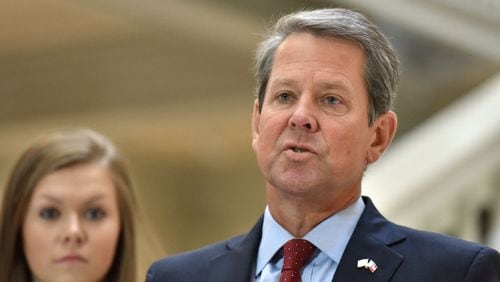Many people are wondering how public education in Georgia will fare under governor-elect Brian Kemp. It’s difficult to predict as Kemp said little about schools during the campaign and has no track record of education activism from which to find clues on where he stands on key questions.
For example:
Will Kemp continue to support and fund the chief turnaround officer created as a consolation prize for Gov. Nathan Deal after voters rejected the Opportunity School District?
Georgia voters and lawmakers have been wary of vouchers. Will Kemp go there anyway?
Charter school growth in Georgia has been slower than in other states, but that restraint has led to fewer scandals related to misspending and fraud. Will Kemp quicken the pace?
One of Kemp's first statements on education came in September when he promised to give teachers a $5,000 raise at an annual cost of $600 million to the state. (The final pricetag to taxpayers could exceed that amount as higher pay also increases pension and other benefit costs.) No one is quite clear where that money will come from, although Kemp says he'll find it.
Beyond the announcement of the raises and a fall press conference where he committed to beefing up school safety and funding a support counselor in every Georgia high school, Kemp has avoided specifics and stayed with platitudes. (You can read the essay on his education plan that he wrote for this blog here.)
On his campaign site, Kemp posted generic slogans. He endorsed “letting teachers teach, local control and school choice.” His position on school choice was broad: “Through school choice, we can give Georgia students – and parents – the learning opportunities and educational environment they want and deserve. As a State Senator, I co-sponsored one of the early charter school bills. During my two terms in office, I fought to enhance educational outcomes through school choice. As governor, I will build on that record by doubling the SSO tax credit, supporting equitable charter school funding, and piloting an ESA program with military families.”
He also called for improving rural education, but again didn’t spell out how he would do that beyond expanding online instruction, which has not proven a boon to the performance of rural kids.
According to his campaign platform: “As governor, I will support and grow virtual learning opportunities for rural students, which includes challenging courses for high achieving students and remedial opportunities for students that need a different environment in order to achieve. We must work with non-profit organizations to fund after school programs that teach soft skills and prepare tomorrow’s workforce. By bringing High Speed Internet to rural Georgia, we can embrace tele-classrooms and make sure that students always have a fast pass to the information super highway!”
Your thoughts on what Kemp should make his priorities in education?
About the Author







